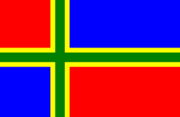Social:Folkspraak
| Folkspraak | |
|---|---|
 | |
| Created by | Collaborative work |
| Date | 1995- |
| Users | small internet-based groups |
| Purpose | constructed languages
|
| Sources | Vocabulary, phonology and grammar from Germanic languages |
| Language codes | |
| ISO 639-3 | None (mis) |
| Glottolog | None |
Folkspraak (also Folksprák and Folksprak; from folk 'people' and spraak 'language', meaning "the language of the people") is an incompletely developed[1] zonal constructed language based on Germanic languages and intended to be easy to learn for any native speaker of a Germanic language,[1] making it suitable to be a sort of lingua franca amongst the Germanic languages community.[2]
The name Folkspraak has also been used in a more general sense to refer to the entire modern Pan-Germanic language collaboration.
Development history
The project's development took place mostly online in a Yahoo group, though disagreements about grammar and orthography means that there are several different versions or "dialects".[2] Disagreement occurs even over which source languages to use, so that only some developers draw from Frisian, Low German and Norwegian Nynorsk, next to the usual source languages of English, Dutch, German, Danish, Norwegian Bokmål, and Swedish.[2]
Overview
The idea behind the project is that a speaker of a Germanic language should be able to read and understand Folkspraak in a week and to write it in a month.[1]
The development of the language is similar in its process to Interlingua—to create a word or a grammatical form in Folkspraak, samples are taken from all of the Germanic languages and the form common to most of the languages is selected.[1] Reference is also made to previously existing and parallel Germanic zonal constructed languages.
Grammar
Alphabet and pronunciation
Folkspraak alphabet is identical to the ISO basic Latin alphabet. Double consonants and consonant groups signalize short vowels. The ⟨c⟩ represents /s/ in front of front vowels (⟨e i y eu⟩) and /k/ in any other position. The digraphs ⟨th⟩ and ⟨ph⟩ represent the same pronunciation as ⟨t⟩ and ⟨p⟩, respectively.
Morphology
Folkspraak has no adjectival or verbal variation. Nouns made from adjectives as well as infinitives end in -e as in de andere ('the other') and have ('to have'). There is no distinction between adjectives and adverbs.
There is no grammatical gender or cases except with personal pronouns: si ('she'), hi ('he'), ik ('I'), mi ('me').
The plurals of nouns are made with -e or, if a noun ends with an unstressed syllable, with -s. Mann (man), manne (men), auto (car), autos (cars).
Syntax
The basic word order is subject–verb–object (SVO). Questions are made by inversion to VSO.
Samples
The Lord's Prayer in several Folkspraak varieties/dialects:[citation needed]
| Folkspraak | Folksprak | Middelsprake | Boksprak | Fůlkspræk |
|---|---|---|---|---|
|
Ons Fater, |
Usser fader, |
User Fader |
Onser Fader |
Ůnsĕr Fadĕr |
From Article 1 of the Universal Declaration of Human Rights:
All mensklik wesings âre boren frî on' gelîk in werđigheid on' rejte. Đê âre begifted mid ferstand on' gewitt on' skulde behandele êlkên in en gêst av brôđerhêd.[2] (All human beings are born free and equal in dignity and rights. They are endowed with reason and conscience and should act towards one another in a spirit of brotherhood.)
See also
- Pan-Germanic language
- Zonal constructed language
- Linguistic purism in English (endeavours to write and/or speak English with fewer words of non-Germanic origin)
Notes
- ↑ 1.0 1.1 1.2 1.3 Folkspraak at Langmaker
- ↑ 2.0 2.1 2.2 2.3 Folkspraak at omniglot.com
External links
- Folksprak.org - containing information like grammar, vocabulary and a wiki
- Folkspraak page at Langmaker (not directly available anymore)
- Folkspraak Omniglot page
- English-Folksprak dictionary
- Folkspraak: Germanic Auxiliary Language - the Yahoo Group where Folkspraak is being developed
- Folkspraak on Wikibooks
- compilation of Folksprak drafts
- Middlespraak - Germanic Common Language - the Yahoo Group where Middelspraak is being developed
- Concise Outlines of Middelspraak
- An illustration of similarities with Dutch
- Frenkisch Grammatik

